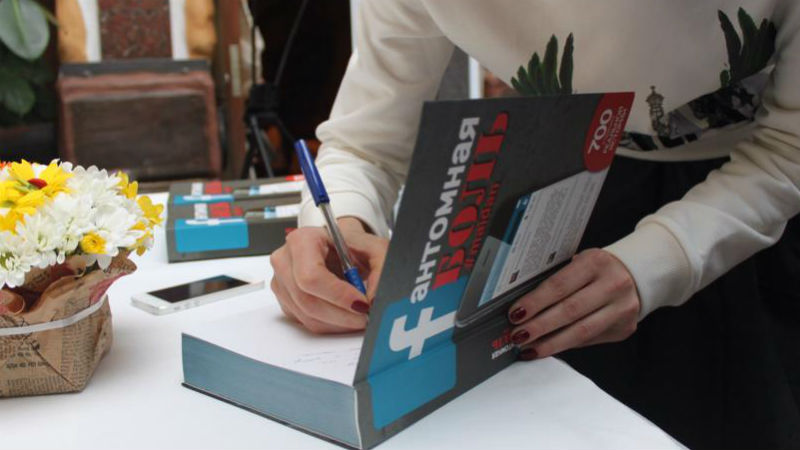
A new Ukrainian book tells the story of Euromaidan in hundreds of Facebook posts. Photo from Facebook.
Social media played a key role in the Euromaidan protests that erupted in Ukraine last fall. Millions of updates were posted by Ukrainians on Facebook and Twitter, thousands of photos and videos uploaded to Instagram and YouTube. This means that a large slice of the protests’ history is preserved only online.
A new book, made up entirely of over 700 Facebook posts, chronicles the events from November 2013 to June 2014 as they were recorded and told by Ukrainian Facebook users. The title of the book, “Phantom Pain #maidan,” recognizes the fleeting nature of memories of the groundbreaking transformations that occurred during and after the unrest, and remembers the loss of those who died during the violent phase of the protests. The book's authors, both Euromaidan activists, Anastasiia Savytska and Andrey Myrhorodskiy, say the idea initially was to do a photo album with some text from Facebook posts, but then the social media content simply took over. Anastasiia says she spent two months deciding which posts to include.
Можна сказати, що відтепер ми маємо матеріальне втіленні революції, яка сталася у Facebook. Що стосується відгуків читачів, то люди у більшості випадків кажуть, що поки не можуть прочитати книгу – надто живими і болючими є спогади.
You could say that we now have a material representation of the revolution which took place on Facebook. As for the readers’ feedback, people are mostly saying they can't read the book yet—the memories are too raw and painful.
Only 3,000 copies of the book have been printed, but it seems to be in demand. Some readers have been commenting on their feelings after getting their hands on the ‘paper Facebook of Euromaidan'—most of the comments are on Facebook, of course. User Victoria Arbuzova-Powell thought the book was valuable because it was a collective creation.
Написанная не одним автором, а всеми. Всеми теми, кто делал историю. Написанная не после, а во время. […] Эту книгу можно разобрать на цитаты.
It's written not by one author, but by everyone. Everyone who made history. It's written not after, but during. […] This book is quote upon quote.
Reader Sergey Gnidets confessed it was an emotional affair to re-read some of the posts.
Отримав. Читаю ці сторінки і мурашки по шкірі. Нахлинули спогади тих подій.
I got the book. I'm reading these pages and I get goosebumps. Overcome with memories of those events.
“Phantom Pain #maidan” only captures a curated glimpse of the ocean of social media traces that Euromaidan has left behind, but as a tangible artifact, it might serve as yet another reminder that those events were very real, and the people who posted those words and shared those thoughts are real as well—something many of us forget as the protests in Ukraine become just another media story.








2 comments
Book a terrific idea but as the Maidan revolution continues, the stream of Facebook, twitter and blog postings continue too. Capturing all this incredible, still-unfolding revolution is impossible but with tools such as “Phantom Pain #Maidan”, together with new technology, the world can have a peek into what those in Ukraine have been going through. Important to add that funds raised from the book sale are intended buy a walking-simulator for Kyiv Military Hospital, where soldiers are undergoing rehabilitation. (http://replika.com.ua/ru/6_kultura/fantomnaya_bol_maidan)
.